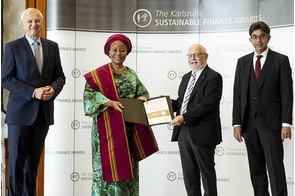Morgan Stanley, EIU launch index to drive investment in inclusive growth

Summary
The Inclusive Growth Opportunities Index 2017 will help investors identify investments across four pillars of inclusion.
The Morgan Stanley Institute for Sustainable Investing – an initiative of the U.S. financial services giant, Morgan Stanley – and The Economist Intelligence Unit, have launched the Inclusive Growth Opportunities Index 2017. According to a statement released on Friday, the index is a tool to help investors identify technology-based opportunities that support inclusive economic growth.
The two organisations said the index is the first in a body of work that will help to drive private capital toward reducing inequality. The study presents opportunities to drive inclusive growth through technology investments across four pillars of inclusion – finance, healthcare, education and gender.
The index ranks 20 countries with compelling investment opportunities that enhance access to finance, education, healthcare, and reduce gender disparities. The opportunities can be analyzed and customized to investors’ specific interests and areas of impact.
Nigeria is ranked 19th with overall score of 33.9 – above Cuba. The United States is the top-ranked country with an overall index score of 64.0. Other African countries on the index are Rwanda (14th) and Kenya (16th).
“As we seek to achieve an inclusive economy that encourages broad-based participation in the benefits of economic growth, there are many compelling opportunities for investors to achieve attractive financial returns while also solving some of the most critical societal problems,” said Audrey Choi, CEO of the Morgan Stanley Institute for Sustainable Investing.
The Economist Intelligence Unit, the business-to-business arm of The Economist Group, worked closely with the Institute and a panel of experts to develop the analytic framework, undertaking extensive research to develop the index and rate and rank the countries. Users of the tool can customize the parameters to reflect specific priorities and interests (e.g., risk appetite or regional focus), enabling users to develop unique and actionable intelligence.
The report sheds light on some key findings, including the fact that in the least developed markets, technology provides significant leapfrog potential, but investment impact is tempered by weak digital literacy and a lack of basic services, like energy, clean water and sanitation.
The report also shows that more developed markets like Brazil and the United States display some of the highest levels of inequality, not just in income but also in terms of the cost of housing, healthcare and education.
The United States experiences more income inequality than the U.K., the Netherlands or Australia, and is most similar to countries like China, Argentina and Turkey when it comes to the difference between the rich and the poor, according to the report. It also shows that digital divides remain prevalent, even in advanced economies, such as Australia where around 40% of low-income people lack broadband access because of the cost.
“The analysis shows how technology can be used to improve opportunities for everyone and create a more inclusive society,” said Samantha Grenville, Senior Consultant at The Economist Intelligence Unit. “The Index provides data-driven insights that put investment considerations in the context of financial, healthcare and education needs as well as gender equity.”
The organisations said climate change mitigation will be addressed in a separate, forthcoming index and report covering the same 20 countries.
The Institute for Sustainable Investing was launched in 2013 to build scalable finance solutions that seek to deliver competitive financial returns while driving positive environmental and social impact.
Related
-
AIM 2022 to boost investments in sustainability, innovation
The theme of the global investment event is “Investments in Sustainable Innovation for a Thriving Future.”
-
Access Bank is first Sustainability Certified African commercial bank
It is not in the least surprising that Access Bank would emerge as the first African commercial bank to become a ...
-
Access Bank underscores sustainability leadership during high-level SSCI meeting
Access Bank is the first commercial bank in Africa to sign up to the global initiative.









_Charging__Power_Grid_-_300x350-202501141447571577.jpg)
